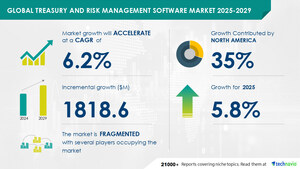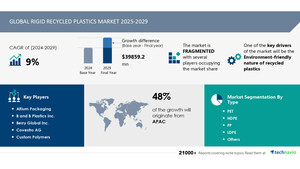NEW YORK, Oct. 28, 2024 /PRNewswire/ -- Report with market evolution powered by AI - The Global Fire Sprinkler Pipes Market size is estimated to grow by USD 5.57 billion from 2024-2028, according to Technavio. The market is estimated to grow at a CAGR of 7% during the forecast period. Growing applications of fire sprinkler pipes is driving market growth, with a trend towards technological advancements in fire sprinklers. However, high maintenance cost for fire sprinkler pipes poses a challenge.Key market players include Aliaxis Holdings SA, API Group Corp., Aquatherm LP, ASC Engineered Solutions, IPEX BRANDING INC., JM Eagle Inc, Johnson Controls International Plc., Mueller Water Products Inc, NIBCO INC., Spears Manufacturing Co., Tata Steel Ltd., The Lubrizol Corp., The Reliable Automatic Sprinkler Co. Inc., The Supreme Industries Ltd., Uponor Corp., Victaulic Co., Viking Group Inc., Zekelman Industries, and Zurn Elkay Water Solutions Corp..
Key insights into market evolution with AI-powered analysis. Explore trends, segmentation, and growth drivers- View the snapshot of this report
Fire Sprinkler Pipes Market Scope |
|
Report Coverage |
Details |
Base year |
2023 |
Historic period |
2018 - 2022 |
Forecast period |
2024-2028 |
Growth momentum & CAGR |
Accelerate at a CAGR of 7% |
Market growth 2024-2028 |
USD 5578 million |
Market structure |
Fragmented |
YoY growth 2022-2023 (%) |
5.8 |
Regional analysis |
APAC, North America, Europe, Middle East and Africa, and South America |
Performing market contribution |
APAC at 50% |
Key countries |
US, China, India, Germany, UK, France, Japan, Brazil, South Korea, and Canada |
Key companies profiled |
Aliaxis Holdings SA, API Group Corp., Aquatherm LP, ASC Engineered Solutions, IPEX BRANDING INC., JM Eagle Inc, Johnson Controls International Plc., Mueller Water Products Inc, NIBCO INC., Spears Manufacturing Co., Tata Steel Ltd., The Lubrizol Corp., The Reliable Automatic Sprinkler Co. Inc., The Supreme Industries Ltd., Uponor Corp., Victaulic Co., Viking Group Inc., Zekelman Industries, and Zurn Elkay Water Solutions Corp. |
Market Driver
The fire sprinkler industry is experiencing a major shift due to technological innovations and regulatory achievements. One significant advancement is the integration of connected tools that improve system efficiency and reliability. These tools enable facility managers to monitor multiple properties' fire sprinkler systems, plan repairs, and prioritize upgrades. By utilizing digital technology, property owners can collaborate with insurance providers to potentially lower premiums. The core functionality of these tools lies in their ability to add connectivity to fire sprinklers, allowing predictive maintenance and real-time insights. Sensors measure parameters such as temperature, pressure, and water presence, transmitting data to the cloud. Aliaxis Holdings SA recently received India's first IS certification for its Fire Pro CPVC fittings, establishing its fire sprinkler piping system as a premier solution. Its advantages include lightweight design, ease of joining, reduced labor costs, and convenient storage. These advancements are driving the adoption of advanced fire sprinkler systems, enhancing safety and efficiency in buildings. As the industry evolves, further innovations are anticipated, setting new standards for fire safety and fueling the growth of the global fire sprinkler pipes market.
Fire sprinkler pipes are essential components of fire protection systems in various industries and buildings. The market for fire sprinkler pipes is growing due to increasing demand for fire safety in sectors like mining, petrochemical, and construction. Carbon steel and ductile iron are popular choices for fire safety pipes, while seamless steel pipes and welded steel tubes are preferred for their strength and durability. Fire pipeline fittings are also in demand, with wet pipe systems, dry pipe systems, deluge systems, and pre-action systems being commonly used. Flammable materials in industries and commercial places necessitate the use of fire sprinkler systems, which are becoming mandatory under the Fire Safety Act. Manufacturers of raw materials for fire sprinkler pipes, such as CPVC, are seeing increased business due to this trend. HI-FOG technology and thermal radiation technology are also gaining popularity for their effectiveness in fighting fires. Infrastructure spending on fire protection systems is expected to grow due to the Green Deal Initiative and the demand for energy-efficient buildings. Fire risk management is a key consideration in the fire safety market, with fire safety audits being conducted regularly to ensure compliance. The housing and commercial sectors are major consumers of fire safety products, with oil and gas and infrastructure projects also contributing significantly. Product finishes and epoxy adhesives are also in demand for fire safety pipe installations. Fire-related incidents and property damage the importance of investing in reliable fire safety systems.
Request Sample of our comprehensive report now to stay ahead in the AI-driven market evolution!
Market Challenges
- Fire sprinkler systems are essential for ensuring safety in both commercial and residential buildings. However, the maintenance costs for fire sprinkler pipes can vary significantly based on factors like system size, complexity, and location. Annual inspections are crucial to maintain the system's functionality and compliance with safety regulations. The cost of these inspections ranges from USD35 to USD200. Repairing leaks in a fire sprinkler system can cost between USD6 and USD8 per square foot, including labor and materials. The national average for repairs is approximately USD250, with most homeowners paying between USD130 and USD360. The high maintenance costs, especially for complex systems or those in hard-to-reach areas, can be challenging for individuals with fixed incomes. This may limit the installation of fire sprinkler systems in residential settings, potentially impacting the growth of the global fire sprinkler pipes market.
- Fire Sprinkler Systems are essential components of fire safety in Commercial Buildings and Residential Buildings, as well as Infrastructure Projects. Wet pipe systems, Dry pipe systems, Deluge systems, and Pre-action systems are common types, each with unique advantages. Fire Safety Audits are crucial for ensuring compliance with the Fire Safety Act and Insurance Requirements. From a Construction Perspective, the demand for Fire Protection Systems is growing due to Infrastructure Development and the Green Deal Initiative's focus on Energy-Efficient Buildings. Raw Materials manufacturers supply Welded pipes and Seamless pipes for these systems, while Epoxy adhesives market caters to product finishes. The Oil and Gas industry and Commercial places require specialized Fire Safety measures, including Gas-Based Suppression Systems and Smoke Detection Technologies. Infrastructure spending on Fire Safety is increasing due to the rising number of Fire-Related Incidents causing Property Damage. Building Safety Regulations mandate regular inspections and maintenance of Fire Sprinkler Systems. Fire risk management is a priority for all stakeholders, including Risk Management teams and Insurance Companies. Water Distribution Patterns in Wet-Pipe Sprinkler Systems and Dry-Pipe Sprinkler Systems play a significant role in effective fire suppression.
Discover how AI is revolutionizing market trends- Get your access now!
Segment Overview
This fire sprinkler pipes market report extensively covers market segmentation by
- Application
- 1.1 Commercial
- 1.2 Residential
- 1.3 Industrial
- Material
- 2.1 Steel
- 2.2 Copper
- 2.3 Others
- Geography
- 3.1 APAC
- 3.2 North America
- 3.3 Europe
- 3.4 Middle East and Africa
- 3.5 South America
1.1 Commercial- The Fire Sprinkler Pipes market is growing due to increasing safety regulations and construction projects. Businesses and buildings invest in fire protection systems to ensure safety. Fire sprinkler pipes are a crucial component of these systems, providing an efficient and reliable means to distribute water in case of a fire. The market is driven by factors such as new building constructions, renovations, and stricter safety codes. Fire sprinkler pipe manufacturers focus on producing high-quality, durable products to meet the demand.
Download a Sample of our comprehensive report today to discover how AI-driven innovations are reshaping competitive dynamics
Research Analysis
Fire sprinkler pipes are essential components of fire protection systems, designed to deliver water or other suppressant agents to put out fires. These pipes are primarily made of carbon steel and ductile iron, known for their strength and durability. Fire safety pipes are a critical infrastructure in various sectors, including mining, petrochemical, and construction. Fittings are crucial accessories that ensure proper connection and sealing of the pipes. Fire pipeline systems have gained significant importance due to the increasing demand for fire safety in commercial places and residential buildings. Infrastructure spending on fire protection systems is on the rise, driven by the Fire Safety Act and the need for effective fire risk management. HI-FOG technology, a high-performance fire suppression system, is increasingly being adopted for its ability to extinguish fires quickly and efficiently. Fire safety is a critical concern in the oil and gas industry, where flammable materials are a constant risk. Fire sprinkler systems are a vital component of fire safety infrastructure in commercial buildings and residential buildings. Welded pipes and seamless pipes offer superior strength and resistance to corrosion, making them ideal for fire safety applications. Infrastructure projects, including new construction and renovations, require the installation of fire protection systems to ensure the safety of occupants and assets.
Market Research Overview
Fire sprinkler pipes play a crucial role in fire safety systems, protecting various industries and structures from the devastating effects of fire. These pipes come in different materials such as carbon steel and ductile iron, which are commonly used due to their strength and durability. Fire safety pipes are integral to fire pipeline systems that distribute water to fire sprinklers, ensuring the swift extinguishing of flames. Flammable materials in sectors like mining and petrochemical require fire protection systems. Fire sprinkler systems employ advanced technologies like HI-FOG and thermal radiation to effectively combat fires. Seamless steel pipes and welded steel tubes are popular choices for fire safety due to their resistance to fire and corrosion. The construction perspective, housing demand, and commercial places drive the market for fire safety systems. Infrastructure spending on fire protection systems is increasing, with a focus on energy-efficient buildings and the Green Deal Initiative. Fire safety audits and regulations are essential for ensuring safety and compliance. Fire risk management is a critical concern for industries, with insurance requirements and safety measures playing significant roles. Raw materials manufacturers produce CPVC, epoxy adhesives, and other essential components for fire safety systems. The oil and gas industry, infrastructure projects, and building safety regulations are other significant markets for fire sprinkler pipes. Product finishes and fire safety technologies like smoke detection and water distribution patterns continue to evolve, enhancing the effectiveness of fire protection systems. Wet-pipe and dry-pipe sprinkler systems cater to various applications, while gas-based suppression systems offer alternative solutions. In summary, the fire sprinkler pipes market encompasses a wide range of applications, technologies, and regulations, all aimed at ensuring fire safety and risk management in various industries and structures.
Table of Contents:
1 Executive Summary
2 Market Landscape
3 Market Sizing
4 Historic Market Size
5 Five Forces Analysis
6 Market Segmentation
- Application
- Commercial
- Residential
- Industrial
- Material
- Steel
- Copper
- Others
- Geography
- APAC
- North America
- Europe
- Middle East And Africa
- South America
7 Customer Landscape
8 Geographic Landscape
9 Drivers, Challenges, and Trends
10 Company Landscape
11 Company Analysis
12 Appendix
About Technavio
Technavio is a leading global technology research and advisory company. Their research and analysis focuses on emerging market trends and provides actionable insights to help businesses identify market opportunities and develop effective strategies to optimize their market positions.
With over 500 specialized analysts, Technavio's report library consists of more than 17,000 reports and counting, covering 800 technologies, spanning across 50 countries. Their client base consists of enterprises of all sizes, including more than 100 Fortune 500 companies. This growing client base relies on Technavio's comprehensive coverage, extensive research, and actionable market insights to identify opportunities in existing and potential markets and assess their competitive positions within changing market scenarios.
Contacts
Technavio Research
Jesse Maida
Media & Marketing Executive
US: +1 844 364 1100
UK: +44 203 893 3200
Email: [email protected]
Website: www.technavio.com/
SOURCE Technavio

WANT YOUR COMPANY'S NEWS FEATURED ON PRNEWSWIRE.COM?
Newsrooms &
Influencers
Digital Media
Outlets
Journalists
Opted In




Share this article